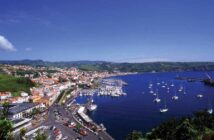One gets the impression that it was never as beautiful, even first time round. Michigan Central Station, located at 2001 15th Street in Detroit’s Corktown neighbourhood, a historic Beaux-Arts landmark, has been transformed into a vibrant hub for mobility innovation and community engagement.
Originally opened in 1913 as a grand train depot, it was meticulously restored by Ford Motor Company over six years (2018–2024) at a cost of nearly $1 billion. Now the centrepiece of a 30-acre technology and cultural district, the station blends its storied past with a forward-thinking vision.
Architectural Splendour: The station’s restored grandeur, designed by Warren & Wetmore and Reed & Stem (the architects of New York’s Grand Central Terminal), is a highlight. Visitors enter through the majestic Grand Hall, featuring 54-foot vaulted ceilings with Guastavino tile arches, marble floors, 29,000 restored tiles, and elegant chandeliers.
The 18-story tower with about 5.5 acres worth of glass, devised as an an office space but never occupied, and the intricate details, like recreated clocks and moldings from historical photos, evoke the station’s early 20th-century glory. The exterior, with its limestone facade and Greco-Roman elements, is illuminated dramatically at night, especially during events like Detroit Lions games.
Michigan Central Station, opened on December 26, 1913, was a grand passenger rail depot designed by Warren & Wetmore and Reed & Stem, serving as Detroit’s gateway to the world. At its peak in the 1940s, it handled over 4,000 passengers daily and employed 3,000 in its office tower, hosting notables like Presidents Herbert Hoover, Harry S. Truman, Franklin D. Roosevelt, Charlie Chaplin, and Frida Kahlo. The station, listed on the National Register of Historic Places in 1975, featured a 230-foot tower, marble floors, and amenities like a florist and restaurant. However, post-World War II shifts to car and air travel led to its decline, with closure in 1988 after Amtrak’s final departure. For three decades, the vacant station became a symbol of Detroit’s economic struggles, plagued by vandalism and decay.
Ford Motor Company acquired the station in 2018 from the Moroun family, launching a $950 million restoration to transform it into the heart of a 30-acre mobility and cultural hub in Corktown. Over 1.7 million hours by 3,100 artisans restored its Beaux-Arts splendour, integrating modern systems while preserving historic elements. The station reopened on June 6, 2024, with a star-studded concert featuring Diana Ross, Jack White, and Big Sean, followed by a 10-day open house drawing 60,000 visitors. Now, it hosts innovation teams, public spaces, and cultural exhibits, with plans for a hotel, restaurant, and potential Amtrak station, cementing its role as a catalyst for Detroit’s renaissance.
In 2025, Michigan Central Station offers a blend of historic beauty, cultural immersion, and cutting-edge innovation. Visitors can explore its restored grandeur, engage with interactive exhibits, and witness Detroit’s revival, with new developments like the NoMad Detroit hotel and potential rail connectivity enhancing its allure as a must-visit destination.
Detroit History Tours leads 90-minute guided tours of the ground floor (up to 25 people per group), available Friday evenings (5:00 PM–9:00 PM) and Saturdays (10:00 AM–5:00 PM) through at least August 2025, with possible extensions. Tours explore the station’s history, restoration, and future, including the Grand Hall, Historic Reading Room, and Historic Arcade. Advance booking is required via michigancentral.com, as tours sell out quickly. Private group tours are also available.
The ex-station is open to the public Monday–Sunday (8:00 AM–5:00 PM) when not hosting private events, with free entry to the ground floor. Visitors praise the immersive experience, though some note limited access to upper floors, which are reserved for future commercial tenants.
Cultural Installations:
- Open Archive: Resurrecting a Landmark: A collection of photographs, artifacts, and treasures (e.g., a message in a bottle found in a wall) detailing Ford’s six-year restoration by 3,100 skilled tradespeople. It showcases the blend of traditional craftsmanship and modern technology used to revive the station.
- Poster Vault: A Visual Trip Through Culture: Located in the Historic Arcade, this exhibit features walls of artifacts and a Detroit-inspired soundtrack, celebrating the city’s visual and musical heritage.
- What’s Your Station Story?: In the Historic Reading Room, visitors can share personal memories and hear stories from others whose lives were touched by the station, such as immigrants arriving in Detroit or WWII troops departing.
- Art Installations: The station hosts rotating art, including Reddymade’s me + you, an interactive sculpture reimagined for Michigan Central, encouraging visitor engagement with Detroit’s cultural narrative.
Visitors describe the station as a “breathtaking” symbol of Detroit’s revival, with its restored beauty evoking emotional responses akin to music or art. The station’s distance from downtown (2 miles) reflects its original design to spur development in Corktown, though some note the need for more dining options on-site. The friendly staff and immersive exhibits make it a must-visit, with 2–3 hours recommended for a full experience.
Free parking is available at the Bagley Mobility Hub (1501 Wabash St.), a block away, with ADA-accessible pathways. Limited accessible street parking and an ADA drop-off at the East entrance (15th Street) are offered. The station is 2 miles from downtown Detroit, accessible via the QLine streetcar or SMART bus routes (562, 563).
ADA-compliant restrooms are available, and the station adheres to ADA guidelines for service animals (excluding emotional support animals). Photography is encouraged, but professional-grade cameras require prior approval.
Situated in Corktown, Michigan Central is near attractions like the Motown Museum (3.5 miles), Detroit Institute of Arts (4 miles), and the Riverwalk (2.5 miles), making it a convenient stop for cultural exploration.
Ford, in partnership with Hilton and Sydell Group, announced in June 2025 that NoMad Detroit, Hilton’s first luxury lifestyle hotel in the U.S., will occupy the top five floors (14–18) of the station’s tower, with 180 rooms, including 30 suites, offering views of Corktown, the Detroit River, and Canada. Construction begins late 2025, with an opening planned for early 2027. The hotel will feature a wellness facility (potentially including fitness and spa elements) on the third floor and a glass-enclosed restaurant in the restored carriage house, with its original 4,000 rivets and a reinstalled historic clock. NoMad aims to be “accessible luxury,” catering to both Detroiters and global visitors with dining and cultural experiences.
A feasibility study, funded by Michigan Central with $500,000, explores a new Amtrak station west of the main building along the CPKC tracks, part of a proposed Chicago-Detroit-Toronto rail corridor. The study, discussed in October 2024, aims for environmental clearance in 2025, with construction potentially starting in 2027. The new station would simplify cross-border connections to Windsor and Toronto, avoiding the cumbersome track setup at Detroit’s current Amtrak station. A multi-modal transit facility and an eight-story, 1,300-space parking deck are also under consideration, enhancing connectivity.
Starting in autumn 2025, the station will host its first commercial occupants, including Ford’s autonomous vehicle teams and other innovation-oriented companies. Ford plans to employ 1,000 workers in the station within its first year, scaling to 2,500, alongside startups and suppliers. Google will use space for tech training and drone testing, supporting the Advanced Aerial Innovation Region (AAIR).
The former trainshed area is being transformed into a public park, expected to progress in 2025, enhancing outdoor recreational spaces and connecting to the Joe Louis Greenway.
In 2025, Michigan Central was named to Fast Company’s Most Innovative Companies list in the Economic Development category for creating jobs, driving investment, and fostering Detroit’s mobility ecosystem. The nearby Newlab at Michigan Central, housed in the restored Book Depository, supports over 600 employees from 100+ startups, reinforcing the district’s innovation hub status.
The station continues its “Summer at The Station” programme through August 2025 (Fridays 5:00 PM–9:00 PM, Saturdays 10:00 AM–5:00 PM, plus Labour Day weekend), offering free tours and outdoor performances. New events, such as art installations and tech showcases, are planned to align with the station’s role as a cultural destination.
The ground floor serves as a community hub with lush public spaces, seating areas, and future retail and dining options (expected post-2025). Outdoor spaces, like the former trainshed area being developed into a public park, connect to the Joe Louis Greenway, a recreational path uniting Detroit neighbourhoods.
The station hosts cultural events, such as outdoor performances by local musicians, programmed by Urban Arts Orchestra and Sound Signature, often held on the Newlab lawn next door. Since its June 2024 reopening, over 300,000 visitors have attended tours, weddings, and events, with 60,000 during the initial 10-day “Michigan Central OPEN” celebration.
Detroit Michigan – architecture – books – Charles H Wright museum – churches – dine in the city – Eastern market – Ford Piquette plant – Henry Ford museum – Henry Ford story – instagram spots – Institute of Arts – Irish community – Michigan Central station) – Motown Museum – movies – murals – musicians – public art works – quotes about Detroit –Rosa Parks seat – Ten things – traffic lights – US cities that declared bankruptcy – Westin Hotel –




